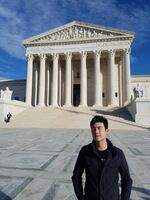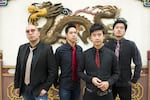
Bandleader Simon Tam, in Washington D.C. for oral arguments.
Courtesy of Simon Tam
The U.S. Patent and Trademark Office goes to court on Wednesday one last time with Portland dance-rock band The Slants. That's when the U.S. Supreme Court will hear the trademark dispute that has played out over eight years.
A lot has happened since Simon Tam first tried to trademark his band's name.
The band has recorded four albums, done 15 tours and gone through so many personnel changes that band bass player and founder, Simon "Young" Tam, is the only original member left.
The band even wrote a song about the trademark case.
Tam is all about his business and seldom misses a chance to boost the band's profile. But even he sounds a little dazed by turns the case has taken.
"I can't wait for it to be over," he said, "and for the first time in almost a decade, to have a band who's not in court."
The band tried to trademark its name for the same reason many other businesses do: to stave off copycats and other intellectual property threats. The U.S. Patent and Trademark Office refused to let Tam register the band's trademark, citing section 2A of the Lanham Act, saying the government should not register marks that are disparaging. That the band was trying to reclaim the name, the PTO said, was irrelevant.
The question before the Supreme Court this week is whether in refusing to grant the mark, the PTO stepped on the band’s Constitutionally protected free speech.
Professor Eugene Volokh teaches First Amendment and copyright law at UCLA law school. He and another professor helped The Slants’ legal team.
“You can register a mark that lets you say something positive about a group,” he said. “For example, ‘Republicans Are Wonderful.’ But you can’t register a mark that says something negative. An example from a past case is ‘Republicans Shouldn’t Breed.’ That’s viewpoint discrimination.”
As the Cato Institute points out in a memorably funny brief for the case, there are any number of bands and brands who have built careers on potentially disparaging names, like NWA and Pansy Division, but none of them get trademarks either.
Volokh worries about the precedent set in this case.
“Let’s say the government were to say, ‘If you want to make a movie or book that’s anti-government, by all means, do that. We just won’t give you copyright protection.’ Obviously, when the government does that it’s going to create a special preference for different viewpoints,” Volokh said.
As sometimes happens in high-level legal battles, this dispute is riddled with strange bedfellows. Tam himself is politically progressive and has done social justice work.

The Slants (left to right: Joe X Jiang, Ken Shima, Tyler Chen, Simon "Young" Tam, Joe X Jiang). The band has toured and released several albums as the trademark dispute has unfolded.
Anthony Pidgeon/Redferns / Courtesy of Simon Tam
The Washington Redskins football team, whose mark was deemed racist and yanked, filed a brief in support of the band. The attorneys arguing the case are all Caucasian. Tam and the PTO’s top administrator are both Asian-American. And the case casts 21st-century brands against trademark law that, in some places, date back to the early part of the 20th century.
The PTO brief points out the kind of decision-making in this case is not unique to just one narrow aspect of trademark law.
Mike Heilbronner, president of Idea legal PC, a Portland law firm that focuses on intellectual property law, said the PTO can have a number of reasons to grant or withhold trademark registration.
Some marks are denied because PTO deems them scandalous or overly descriptive. If the Supreme Court were to side with The Slants, it could disrupt a lot of other aspects of intellectual property law, making them vulnerable to challenge.
“If you were to look at all trademark registrations,” Heilbronner said, “the percentage that involve any kind of disparaging mark is minuscule, well below 1 percent.
"On the other hand, if it’s true other aspects of the federal registration are subject to challenge," he added, "that could create a significant amount of uncertainty.”
Heilbronner said he doesn’t personally think the denial is discrimination based on viewpoint. If, for example, an all-white band tried to register the mark, the PTO would still decline to do so. But observers have said The Slants may have a decent chance, given how the federal circuit court of appeals decided in their favor.
If the Slants were to lose the case, they could still continue using their band name and keep presenting an empowered Asian-American image. They would still have some trademark rights, even without the registration. But they would have less legal standing if they ever needed to protect their brand.
Tam said he’s not afraid of that.
“When we first got rejected, our arguments weren’t on free speech” he recalled. “It was just ‘The Slants is not disparaging to Asians.' Over time it’s evolved a bit because I’ve seen how restrictions on free speech can affect marginalized communities. That’s why we’ve chosen to fight for so long.”
Tam and the band crowdfunded to bankroll the band’s trip to the court. Tam’s attorneys managed to finagle extra seats so the whole band could be there.
A ruling for the high court might happen in late spring.
In the meantime, The Slants will play dates in Portland Jan. 21 for Rinku Con at Portland State University and a Japanese New Year celebration Jan. 29.
